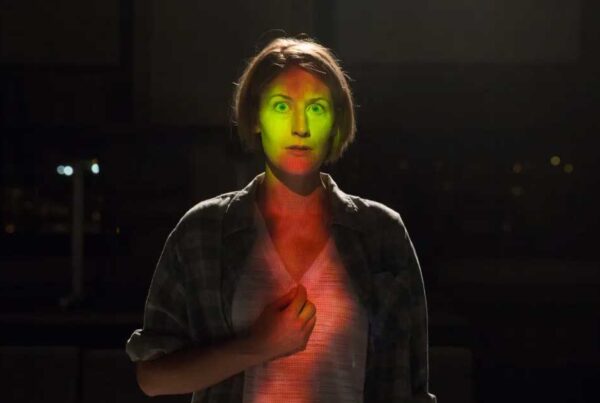
Pittsburgh Owlscribe – Walk up the marble staircase of the Frick Building in Downtown Pittsburgh to the second level, and you’ll likely think, like I did, that you’re entering a disco instead of a makeshift theater space. Thump, thump, the bass notes of a lively dance tune pop out at you from above.
On arrival, the site is definitely festive with circular tables surrounded by café chairs, mood-inducing lighting (by C. Todd Brown), and bleacher stands for additional seating along the back wall. Before Quantum Theatre’s new play, The Devil Is a Lie, even begins, the audience is asked to play a role.
Grab a vodka cranberry cocktail courtesy Quantum Spirits of Carnegie, (a Cape Codder for those who’ve been to Provincetown), and a snack cup, and pretend you’re a board member/investor of Voltaire, a highly successful tech company, attending a corporate party.
Pick your seat, sip, munch and watch as the house manager (Marsha Mayhak) sashays through the room explaining that everyone is invited to scan a QR code in their programs and use it to cast votes on their smart phones during the meeting on a variety of options. It’s much like taking a multiple choice test but with results that supposedly affect the story line of the play that follows.
Sound like hi-tech, interactive fun? Youbetcha.
Things get started when we meet George Fast, (Sam Turich), the aggressive, alpha male, CEO-ish, head of Voltaire, who has the morals of a Machiavelli and the empathy of Genghis Kahn. Well nearly. Fast is the kind of guy who was probably half class clown, half class bully during his high school days. He seems to have kept a even balance on these traits now that he’s become successful and powerful. But what price has he paid for his entrepreneurial triumphs?
It seems that his journey took a supernatural Faustian turn somewhere in the past and now a day of reckoning is fast approaching.
Basking in Fast’s limelight is Margarita (Christine Weber), a visibly pregnant, submissive and dutiful trophy wife. Weber plays a couple of characters, each one pulled off with convincing subtlety and theatrical verisimilitude.
During Fast’s introductory remarks to his investors, he exchanges some lively repartee with Lucy (Lisa Sanaye Dring), a diminutive sprite of a gal with a moxie to match Fast’s. Lucy’s job as event coordinator has her invite a DJ, known as Dogg (LaTrea Rembert), to keep the celebration moving.
Dogg, at first, works in the shadows in back of the carefully designed DJ booth (a construct of set designer, Sasha Schwartz) and feels out of place spinning discs for a bunch of staid investors. As the play progresses, he emerges as the lynch pin of the plot, the one around whom the play’s theme and ultimate premise is built.
Rembert is the most relaxed and low keyed of the acting quartet and the most fun to listen to. His lines are, perhaps the most poignant, so keep a careful ear on what he has to say.
Director Kyle Hayden speeds up the action to an almost frenzied tempo as the characters take on Protean fluidity, morphing back and forth into a spectrum of personae. Ideas, concepts and thoughts are entertained with an almost opaque randomness. So much so that I briefly toyed with the idea that the play had been written by one of the new AI apps I’ve been hearing a lot about. Very human playwright, Jennifer Chang, introduces a mélange of concepts in her work that include worm holes, a gender-neutral God and au currant topics like misogyny, race, class and gender that come at you in everything, everywhere, all at once fashion. If The Devil Is a Lie were a painting instead of a drama, it would be an abstract, more Picasso than Mondrian, more Kandinsky than Pollock.
In its latest production, Quantum Theater continues its modus operandi of staging provocative, cerebral and poignant works. Not to imply some sort of causality here, BUT, after I returned home and went to bed, I had some remarkable flashes of imagery while experiencing REM sleep. While not true dreams (they were too plotless and amorphic for that), they did prove amusing. To create a musical simile, it was like experiencing an entropic progression of fatuous chords, playful arpeggios and supercilious credenzas. If you’re at all curious, at all adventurous, give the play a try and see what comes of it.




